Omid Scobie royal book: More like Action Replay than Endgame
- Published
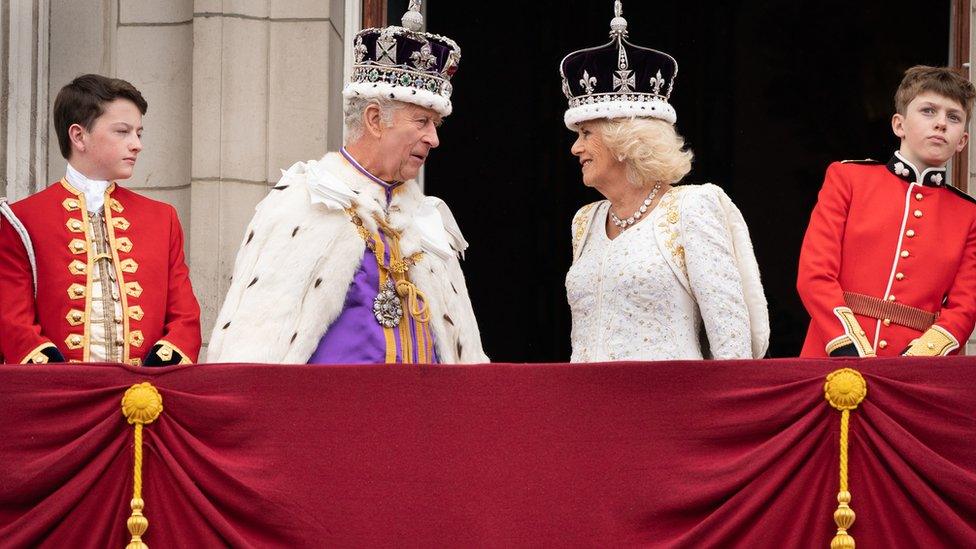
Omid Scobie's book is highly critical of much of the Royal Family
If you're looking for sizzling royal drama, untold intrigue and scandal, this new book is probably going to be a disappointment. It's called Endgame but much of it feels more like Action Replay.
Omid Scobie's widely trailed book covers familiar territory, with an account of family tensions and palace plots, through the era of Prince Harry and Meghan's departure for the US, the late Queen's death and into the new reign of King Charles.
But with its relentlessly recriminatory tone, it's often more mope opera than soap opera. It's a slightly 2-D world where malign palace officials seem to be permanently conspiring with journalists. The chaos, cock-ups and boredom of real-life never seem to intrude.
It's inevitable that Endgame will be compared with Prince Harry's firecracker memoir Spare. That was a book filled with first-hand emotions and raw experience. There were fights, drugs, fear, grieving and not to mention a frozen penis.
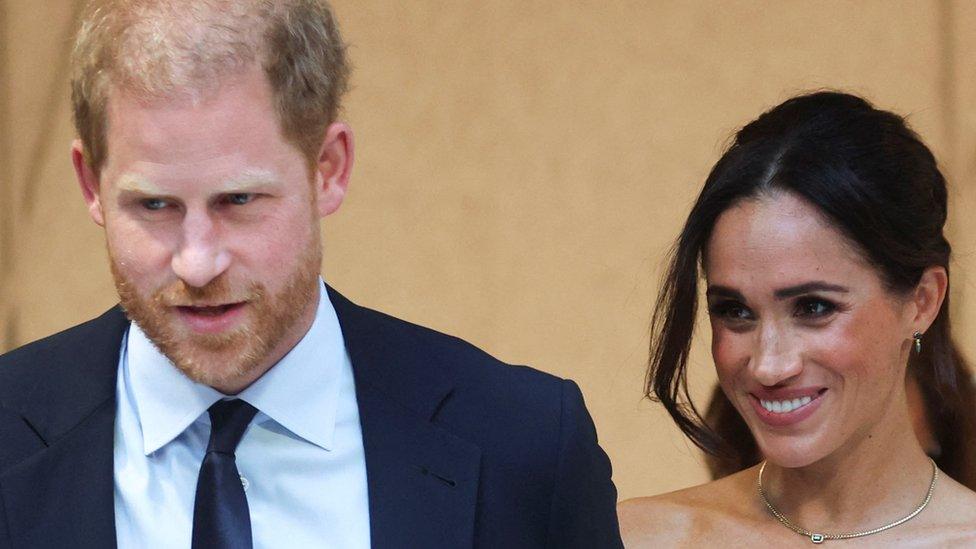
Prince Harry and Meghan are said not to have played any part in this book
Endgame is a much less red-blooded piece of writing. It's more eggshell than bombshell. The title references a chess game, but it's a highly one-sided match, all attack and not much defence.
In Scobie's book, Prince William is painted as emotionally volatile and manipulative, freezing out his brother.
He's described as a "company man - an institutional champion who's privately embraced the draconian tactics of an antiquated and often vicious institution".
There are suggestions of tensions between his ambitions and the King's "transitional" reign.
Catherine, the Princess of Wales, in this version is "cold", nicknamed "Katie Keen", an almost silent figure trapped in endless photo-opportunities.
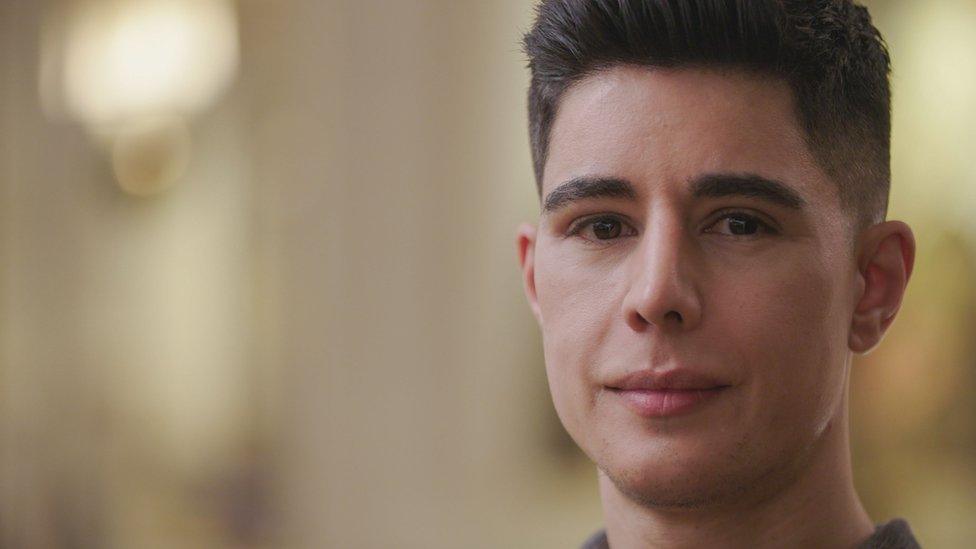
Omid Scobie's latest book returns to tensions within the Royal Family
The royal outrage industry - "how dare they say that!" - is always turning its amps up to 11. But when one of the shocking revelations is that Catherine was accused of being "coachable" you have to think there are probably worse things to be called.
The King is a "stubborn eccentric" and a "flawed father" while Queen Camilla is accused of conniving with the press to improve her public image.
But perhaps their greatest flaw is not being Prince Harry and Meghan, whose presence hangs heavily in the background.
Their Netflix documentary and Harry's Spare are seen as success stories taking the limelight from the jealous royal relations.
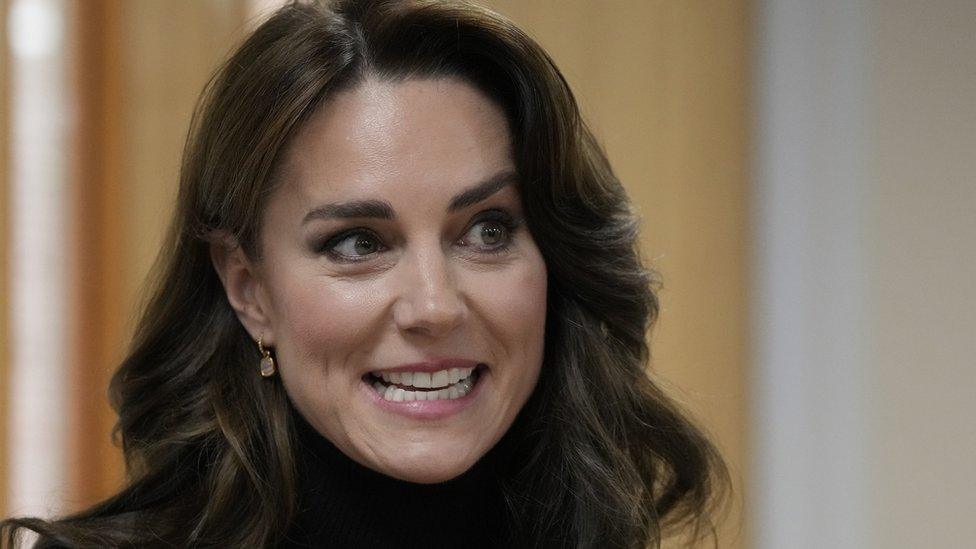
The book doesn't portray the Princess of Wales in a particularly flattering light
Although the author is known for his association with the Sussexes, it was made clear that Prince Harry and Meghan had no involvement in this book project, but it certainly seems to be highly sympathetic to them.
For instance, on the row about Prince Harry's security and losing his home at Frogmore Cottage, the book says: "Staying on the Windsor estate was the Sussex family's only truly safe option when visiting the United Kingdom, as the grounds are surrounded by armed guards."
Is it really the only safe place in an entire country?
There are fresh revelations about some familiar controversies, but in a way that's more collectors' boxed set than thunderbolts.
For instance, in the Oprah interview row about who in the Royal Family had been asking questions about the skin colour of Meghan and Harry's baby, we're told that two people were involved.
We're not given their identities, which would be the real bombshell, but according to his sources their names were mentioned in letters between Meghan and King Charles.
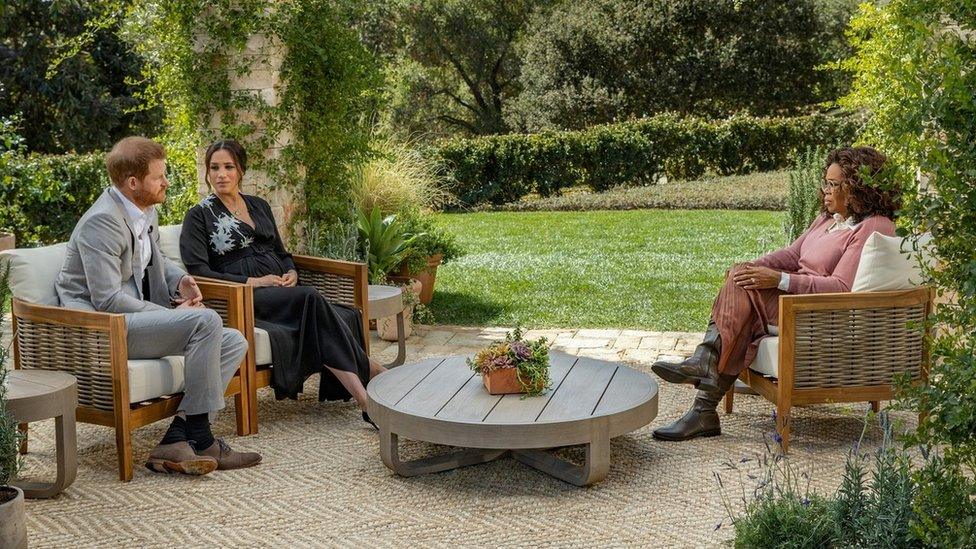
Meghan told Oprah Winfrey in their interview that she did not get royal help when she asked for it
There's also a revealing claim that Prince William was a driving force in the removal of titles and honours from Prince Andrew.
The book touches on some of the bigger underlying challenges to the monarchy, such as its serious problem in engaging with younger generations. This isn't just teenagers, the most recent polling suggests only lukewarm support for the monarchy among the under-50s.
The age of deference is gone and there's an expectation that the monarchy will show its workings, particularly on issues such as its finances.
But even among those sceptical about the monarchy, the publicity surrounding the book reflects the fascination for these royal dramas - particularly anything to do with Prince Harry and Meghan.
They're now their own separate front in the culture war. They attract hostility and support in a way that often seems extreme and newspaper websites are bulging with stories about them, because they know people will click to read more.
But if the royal story is seen as soap opera, then storylines keep moving forward. And there's something that already feels slightly out-of-date about this latest royal book.
It can feel like that grimmest of media moments, being cornered by a reporter wanting to talk about their old stories.
This is still fighting the battles that saw Prince Harry and Meghan leave the UK, while the more recent mood music from the California-based couple has been about olive branches and reconciliations, with a birthday phone call for the King. The story has moved on.
The depiction of the King, as a rather temperamental figure getting his toothpaste squeezed and laces ironed, also feels like a much younger caricature. Now aged 75, the oldest person to have come to the throne, King Charles spent his birthday in a warehouse launching plans for food banks.
A more interesting question might be about what he's quietly saying about the state of the nation.
The Endgame of the title suggests an institution that's in serious trouble. But this won't be the book to sink it.

You can see more royal stories in the free BBC Royal Watch newsletter emailed each week - sign up here from within the UK. or here, from outside the UK, external.